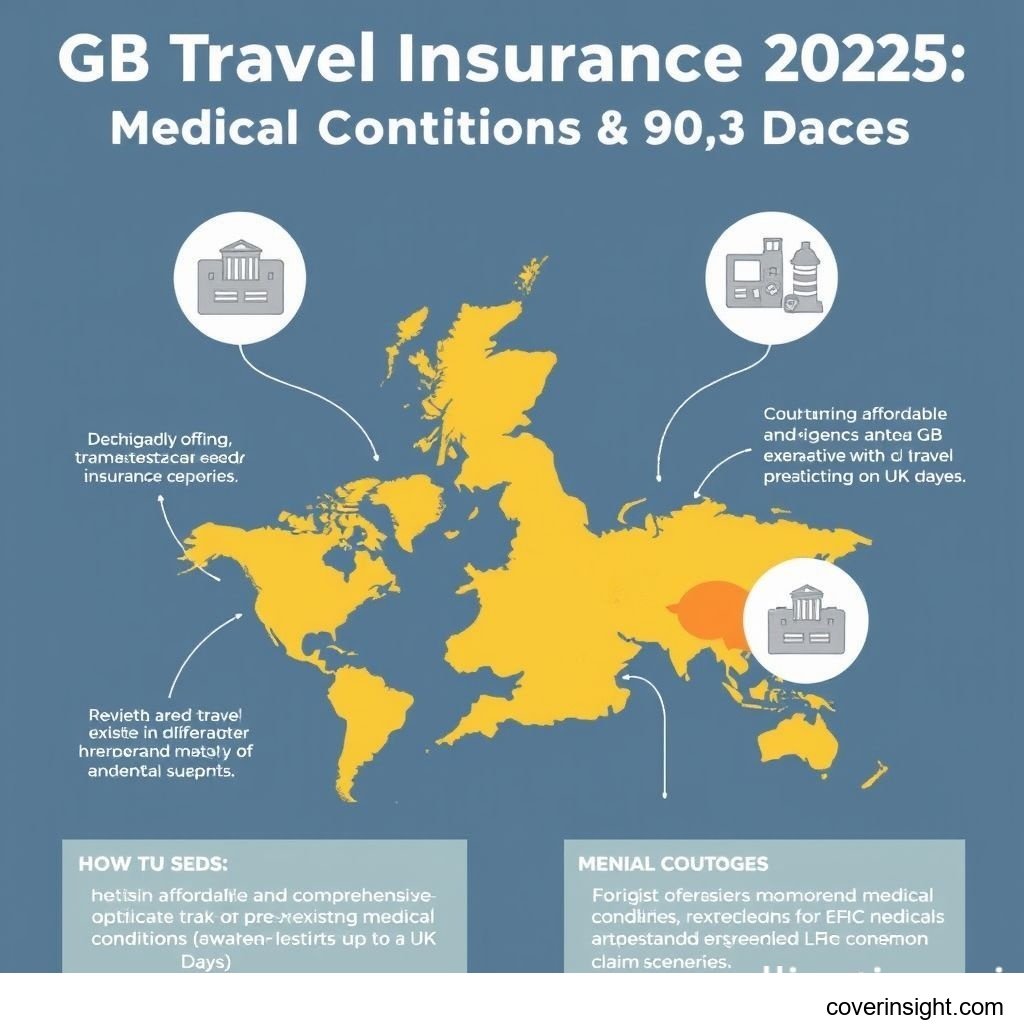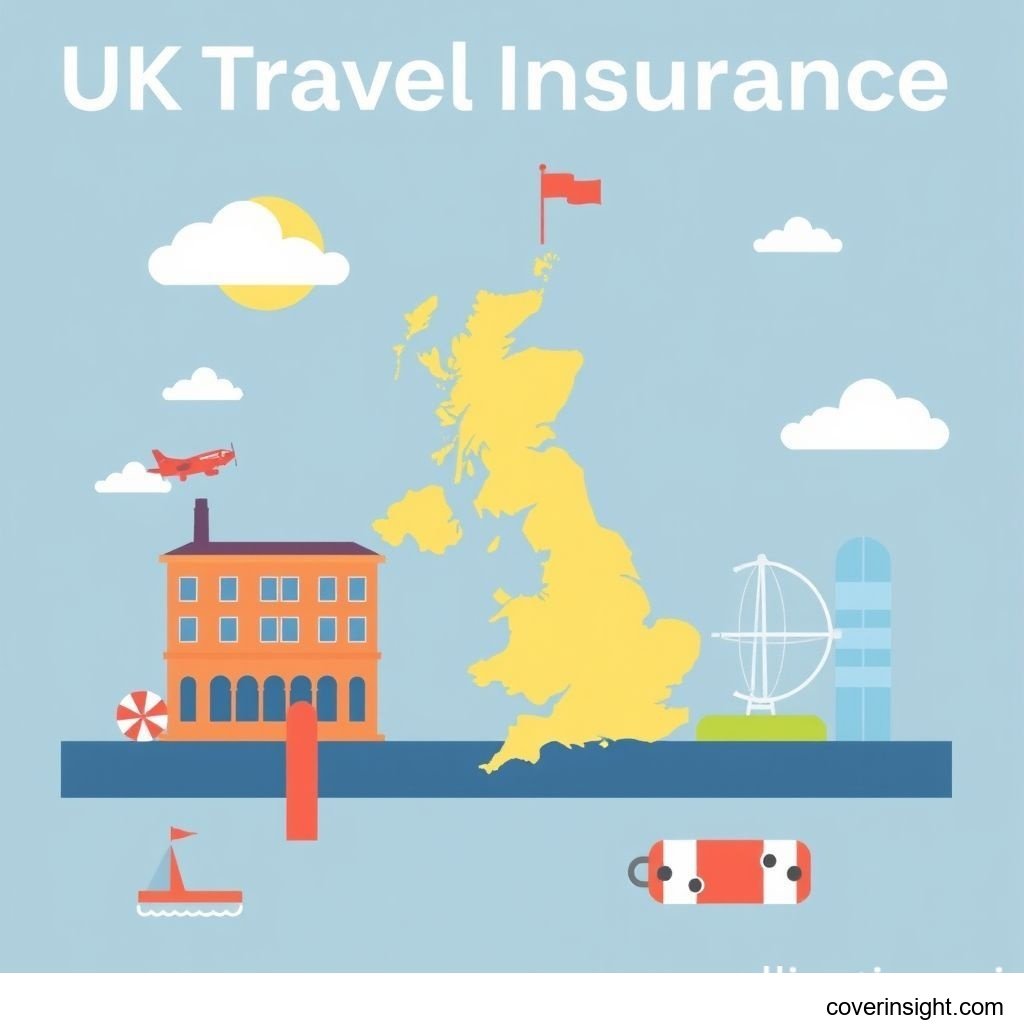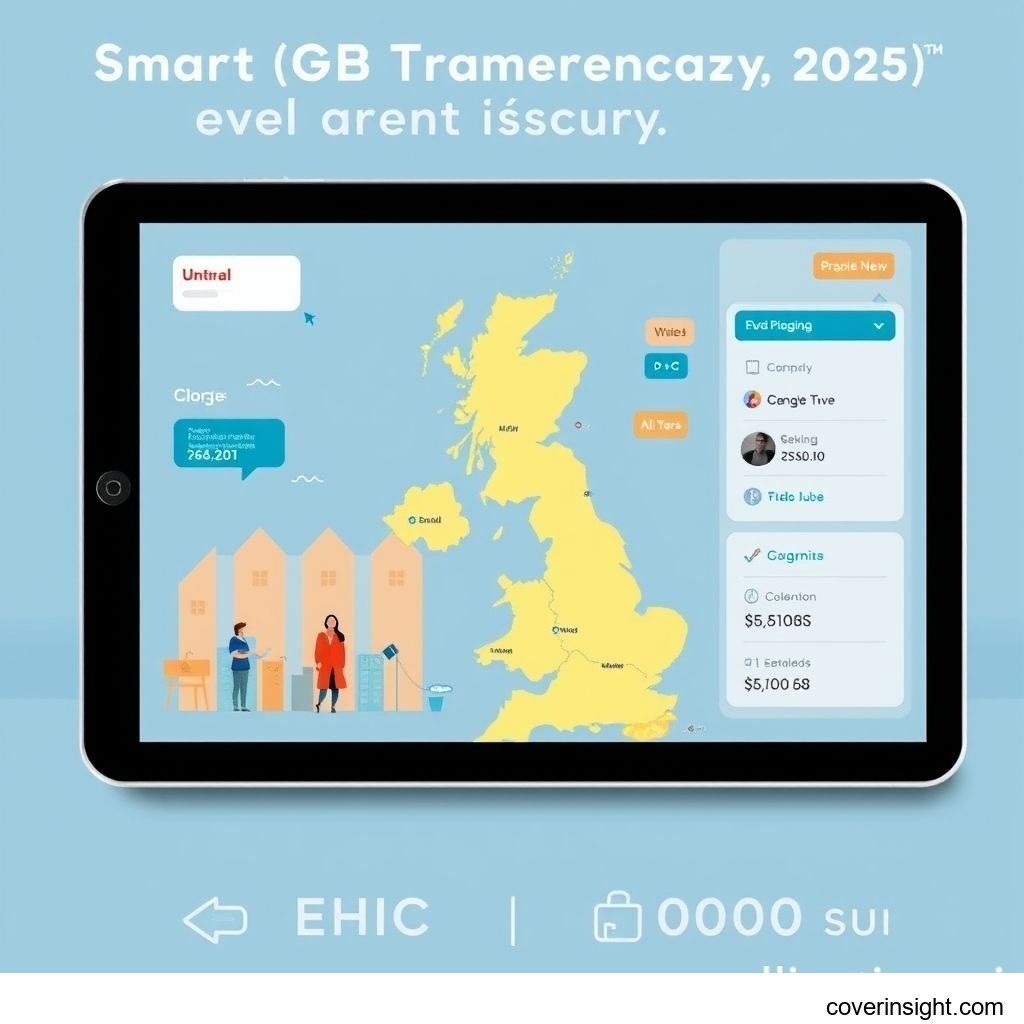Introduction
As 2025 approaches, securing the right travel insurance remains a top priority for British travellers. For many, this means finding cheap travel insurance with medical conditions that offers comprehensive protection without breaking the bank. Navigating the complexities of pre-existing health issues and ensuring adequate cover, especially for trips up to 90 days, is crucial for peace of mind. This guide explores how to find suitable policies, what to look for, and key considerations for your journey. Having appropriate cover ensures that any unexpected medical emergencies abroad are handled efficiently, preventing potentially astronomical costs and unnecessary stress. It's not just about compliance; it's about safeguarding your financial well-being and health while exploring the world.
Understanding Medical Conditions for Travel Insurance
Understanding how medical conditions impact your travel insurance is fundamental. It's a critical step in securing cheap travel insurance with medical conditions that genuinely meets your needs. Disclosure is not merely a formality; it's the cornerstone of a valid policy. Failing to declare all relevant health issues can invalidate your cover, leaving you vulnerable to significant expenses if an emergency arises.
What Constitutes a Medical Condition?
In the context of travel insurance, a "medical condition" typically refers to any illness, injury, or disability that has been diagnosed, treated, or for which medical advice has been sought. This includes chronic conditions, past surgeries, and ongoing treatments.
Common examples include:
-
Heart conditions (e.g., angina, high blood pressure)
-
Respiratory issues (e.g., asthma, COPD)
-
Diabetes (Type 1 or Type 2)
-
Cancer (past or present)
-
Mental health conditions (e.g., depression, anxiety)
-
Joint problems (e.g., arthritis)
-
Neurological conditions (e.g., epilepsy, stroke history)
Insurers will assess these conditions based on severity, stability, and prognosis. The goal is to provide accurate information to allow them to correctly assess the risk.
The Importance of Full Disclosure
Full and honest disclosure of your medical history is paramount. When obtaining cheap travel insurance with medical conditions, insurers use this information to determine your premium and the terms of your policy. They may ask detailed questions about:
-
Diagnosis date: When was the condition first identified?
-
Treatment: What medications or therapies are you receiving?
-
Hospitalisations: Have you been hospitalised for this condition recently?
-
Stability: Is the condition stable and well-controlled?
-
Future plans: Are there any planned surgeries or investigations?
Failure to disclose a condition, even minor ones, could lead to your claim being rejected. The insurer could argue that had they known, they would not have offered the policy or would have done so on different terms. It’s always best to be transparent to ensure your cheap travel insurance with medical conditions remains valid throughout your trip. For more guidance on consumer rights, you can consult the Financial Conduct Authority.
Coverage Details for Cheap Travel Insurance with Medical Conditions
When comparing policies, it's vital to look beyond just the price. While you're seeking cheap travel insurance with medical conditions, ensuring adequate cover is equally important. A robust policy should protect you from a wide range of unexpected events, particularly those related to your health.
What’s Included
A comprehensive travel insurance policy, even a seemingly cheap travel insurance with medical conditions option, should typically include:
-
Emergency Medical Expenses: This is the most critical component for individuals with medical conditions. It covers hospitalisation, doctor's fees, prescription medication, and emergency dental treatment abroad. Ensure the coverage limit is substantial (e.g., millions of pounds).
-
Repatriation: The cost of bringing you back to the UK if medically necessary. This can be extremely expensive without insurance.
-
Cancellation and Curtailment: Reimbursement for non-refundable travel and accommodation costs if your trip is cancelled or cut short due to unforeseen circumstances, including medical emergencies.
-
Baggage and Personal Belongings: Cover for lost, stolen, or damaged luggage.
-
Personal Liability: Protection if you accidentally injure someone or damage their property.
-
Travel Delay and Missed Departure: Compensation for significant delays or if you miss your connecting flight due to an insured event.
Many policies designed for those with pre-existing conditions will specifically outline the cover provided for listed medical conditions, including necessary follow-up appointments during your trip.
Common Exclusions
Even the best policies have exclusions. It's crucial to be aware of these when choosing cheap travel insurance with medical conditions. Common exclusions include:
-
Undeclared Medical Conditions: As mentioned, failure to disclose can void your policy.
-
Experimental Treatment: Costs for unproven or non-essential medical procedures.
-
Routine Medical Check-ups: General health checks not related to an emergency.
-
Alcohol or Drug-Related Incidents: Injuries or illnesses resulting from excessive consumption.
-
Pre-existing Conditions Not Declared: Any condition for which you have received treatment or advice but haven't informed your insurer.
-
Self-inflicted Injuries: Harm intentionally caused to oneself.
-
Adventure Sports: Certain high-risk activities (e.g., bungee jumping, skydiving) unless specific additional cover is purchased.
Always read the policy wording carefully to understand what is not covered. This diligence ensures your cheap travel insurance with medical conditions provides genuine protection.
EHIC Replacement Coverage and Beyond
The European Health Insurance Card (EHIC), and its successor, the Global Health Insurance Card (GHIC), provide access to state-provided healthcare during a temporary stay in EU countries, and in some cases, other select countries. While useful, it is crucial to understand that neither is a substitute for comprehensive travel insurance. Your GHIC provides treatment at the same cost as a local resident, which may not be free. It does not cover:
-
Private medical treatment
-
Repatriation back to the UK
-
Cancellation or curtailment of your trip
-
Lost baggage or personal liability
Therefore, even with a GHIC, dedicated travel insurance is essential. Many policies offering EHIC replacement coverage go beyond this, providing financial protection for a much wider range of eventualities, including medical evacuation and full private medical care. This ensures you receive the best possible treatment, regardless of the local healthcare system.
Cost Analysis: Finding Cheap Travel Insurance with Medical Conditions
While the term "cheap" might imply basic cover, finding cheap travel insurance with medical conditions is more about value for money. It's about balancing affordability with adequate protection. Understanding the factors that influence premiums is key to making an informed decision.
Price Factors for Comprehensive Cover
Several elements contribute to the cost of cheap travel insurance with medical conditions:
-
Age: Older travellers typically pay more due to higher perceived health risks.
-
Destination: Healthcare costs vary significantly worldwide. Countries like the USA or Canada have much higher medical expenses, impacting premiums.
-
Trip Duration: Longer trips generally cost more as the period of risk increases. A 90-day trip will be more expensive than a 7-day trip.
-
Medical Conditions Declared: The number, type, and severity of your conditions will directly affect the price. Stable, well-managed conditions may have less impact than recent, unstable ones.
-
Level of Coverage: Higher medical expense limits, lower excesses, and additional benefits (e.g., cruise cover, winter sports) will increase the premium.
-
Type of Policy: Single-trip policies for 90 days are common, but annual multi-trip policies can sometimes be more cost-effective if you plan multiple journeys.
-
Excess: A higher excess (the amount you pay towards a claim) can reduce your initial premium, but means you pay more if you claim.
It's important to compare quotes from multiple providers to find competitive rates. You can often start your search for Insurance Resources Global.
Saving Tips and Family Plan Discounts
While searching for cheap travel insurance with medical conditions, several strategies can help you reduce costs:
-
Compare Multiple Quotes: Use comparison websites and direct insurers. Prices can vary significantly for the same level of cover.
-
Be Accurate and Honest: Providing precise details about your medical conditions can prevent overpaying for unnecessary risk assessments.
-
Consider an Annual Multi-Trip Policy: If you plan to travel more than twice in a year, an annual policy might be cheaper than multiple single-trip policies, especially if you qualify for family plan discounts.
-
Increase Your Excess: If you're comfortable with a higher out-of-pocket payment in case of a claim, increasing your excess can lower your premium.
-
Limit Unnecessary Add-ons: Only pay for the cover you genuinely need. If you're not participating in adventure sports, don't pay for that specific add-on.
-
Look for Loyalty Discounts: Some insurers offer discounts for existing customers or those renewing policies.
-
**Utilise Family Plan Discounts: Many insurers provide reduced rates when insuring multiple family members on a single policy. This can be a significant saving for families travelling together.
By implementing these tips, you can find a policy that fits your budget without compromising on essential protection. For industry standards and consumer information, refer to the Association of British Insurers.
Applying for and Managing Your Policy
The process of applying for and managing your cheap travel insurance with medical conditions should be straightforward, but attention to detail is essential. From initial application to potential policy amendments, understanding the steps ensures continuous and valid cover.
The Application Process
Applying for cheap travel insurance with medical conditions typically involves an online questionnaire or a phone interview. Be prepared to provide:
-
Personal Details: Name, date of birth, address.
-
Travel Details: Destination(s), departure and return dates (e.g., up to 90 days).
-
Medical History: This is the most crucial part. You'll be asked specific questions about your conditions, including diagnosis dates, medications, hospitalisations, and any planned treatments. Answer truthfully and comprehensively.
-
Lifestyle Information: Some insurers may ask about smoking status or alcohol consumption.
Once you submit your details, the insurer will assess the risk and provide a quote. If you accept, you'll receive your policy documents, usually via email. Review these documents immediately to ensure all details are correct and that you understand the terms and conditions.
Policy Amendments and Renewals
Life circumstances and health can change, even after you've purchased cheap travel insurance with medical conditions. It's vital to:
-
Notify Insurer of Changes: If your medical condition changes (e.g., a new diagnosis, a worsening of an existing condition, or a new medication) before your trip, you must inform your insurer. Failure to do so could invalidate your policy. They may adjust your premium or terms.
-
Extend Cover: If your trip extends beyond 90 days, or the duration originally insured, contact your provider to extend the policy.
-
Renew Annually: For annual multi-trip policies, remember to renew on time. Review your health status each year when renewing your cheap travel insurance with medical conditions to ensure your cover remains appropriate.
Proactive management of your policy ensures you are always properly covered.
Navigating Claims and Support for Your Travel Insurance
Even with the best preparation, unforeseen events can occur. Knowing how to navigate claims and access support is crucial when you have cheap travel insurance with medical conditions. Prompt and accurate reporting is key to a successful claim.
Making a Claim
If you need to make a claim, especially for a medical emergency, act quickly.
-
Contact Your Insurer's Emergency Assistance Line: This number is usually available 24/7 and should be on your policy documents. Call them as soon as possible, especially before undergoing any significant medical treatment. They can authorise treatment, arrange transfers, and guide you through the process.
-
Gather Documentation: Keep all relevant paperwork, including:
-
Medical reports and discharge summaries
-
Prescriptions and receipts for medication
-
Police reports (for theft)
-
Airline reports (for lost baggage or delays)
-
Original receipts for expenses (e.g., medical bills, taxi fares to clinics).
-
-
Complete Claim Form: Your insurer will provide a claim form to fill out. Be detailed and honest.
-
Submit Documentation: Send all required documents to your insurer promptly.
The more information you provide, the smoother the claims process for your cheap travel insurance with medical conditions will be.
Seeking Assistance and Complaints
If you encounter issues or are unhappy with your insurer's decision regarding your cheap travel insurance with medical conditions, there are avenues for support:
-
Internal Complaints Procedure: First, follow your insurer's formal complaints procedure. This is usually outlined in your policy documents or on their website.
-
Financial Ombudsman Service (FOS): If you remain dissatisfied after exhausting the insurer's internal complaints process, you can escalate your complaint to the Financial Ombudsman Service. The FOS is an independent body that resolves disputes between consumers and financial services firms. They can provide an impartial review of your case.
-
Consumer Helplines: Organisations like Citizens Advice can offer guidance on your rights and how to proceed with a complaint.
Always keep records of all communications, including dates, names, and what was discussed, when dealing with claims or complaints about your cheap travel insurance with medical conditions.
FAQs about Cheap Travel Insurance with Medical Conditions
Here are answers to common questions about securing cheap travel insurance with medical conditions for your 2025 travels.
How much does cheap travel insurance with medical conditions cost?
The cost varies significantly based on factors like your age, destination, duration of travel (e.g., up to 90 days), and the nature of your medical conditions. While a basic policy for a short European trip might be under £50, a longer trip to a high-cost country with multiple complex conditions could cost several hundred pounds. Shopping around is essential to find cheap travel insurance with medical conditions that fits your budget.
What affects premiums?
Premiums are primarily affected by the level of risk the insurer takes on. Key factors include: your age, the number and stability of your medical conditions, the length and destination of your trip (e.g., 90 days max), and the overall level of cover chosen (e.g., higher medical limits, included specific activities). Choosing cheap travel insurance with medical conditions often means balancing these factors.
Is it mandatory?
While not legally mandatory for travel from GB, having travel insurance, especially cheap travel insurance with medical conditions, is highly recommended. Without it, you are personally responsible for all medical costs, emergency repatriation, and other financial losses if something goes wrong. These costs can easily run into tens or hundreds of thousands of pounds.
How to choose?
When choosing cheap travel insurance with medical conditions, consider these steps:
-
Assess Your Needs: List all medical conditions and desired cover (e.g., 90 days, specific activities).
-
Compare Quotes: Use comparison sites and check directly with specialist insurers.
-
Read Policy Wording: Understand what is and isn't covered, paying close attention to medical condition clauses and exclusions.
-
Check Customer Reviews: See what other travellers say about the insurer's claims process and customer service.
-
Look for Family Plan Discounts: If travelling with family, this can significantly reduce costs.
Consequences of no coverage?
The consequences of travelling without appropriate cheap travel insurance with medical conditions can be severe. You could face:
-
Massive Medical Bills: If you fall ill or have an accident, you'll bear the full cost of medical treatment, potentially including surgery, hospital stays, and medication.
-
Repatriation Costs: The expense of being medically evacuated or flown back to the UK can be exorbitant.
-
Financial Loss: No reimbursement for cancelled flights, lost baggage, or other unforeseen travel disruptions.
-
Stress and Hardship: Dealing with medical emergencies abroad without financial support adds immense stress during an already difficult time.
Therefore, investing in cheap travel insurance with medical conditions is a small price to pay for significant peace of mind. For comprehensive information and to start your search, visit GB Insurance Home.








Comments